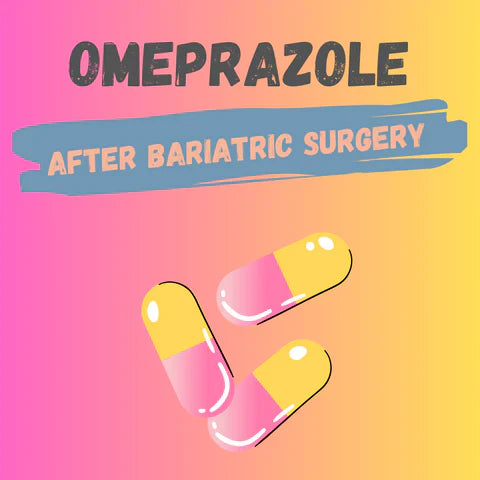Your cart is empty

Why Gut Health Matters When Taking Ozempic
Gut Health While Taking Ozempic
When you're taking Ozempic to manage your type 2 diabetes, or even for weight loss, it's so important to pay attention to your gut health. Your gut is responsible for breaking down food and medicine, and a healthy gut can help Ozempic work more effectively for you. Let's dive into the reasons why gut health is so important:
Shop Our GLP-1 Diet Food Collections: GLP-1 Protein Shakes | GLP-1 Protein Bars | All GLP-1 Diet Foods
Ozempic Works Better
The good bacteria in your gut, known as the microbiome, can enhance the absorption and effectiveness of Ozempic. When your gut is healthy, your body can use the medication more efficiently. Specific gut bacteria, such as Akkermansia muciniphila, have been shown to improve glucose metabolism and support the action of diabetes medications like Ozempic.
Less Tummy Troubles
Ozempic can sometimes cause gastrointestinal side effects like nausea, vomiting, and diarrhea. A healthy gut can help reduce these issues by maintaining a balanced and well-functioning digestive system. Consuming probiotic-rich foods, such as yogurt, kefir, sauerkraut, and kimchi, can help promote a healthy gut and alleviate digestive discomfort. On the other hand, it's essential to be aware of the foods to avoid while taking Ozempic, as some may exacerbate gastrointestinal side effects or interfere with the medication's effectiveness.
Better Blood Sugar Control
Your gut plays a significant role in glucose metabolism. A healthy gut microbiome can help regulate blood sugar levels more effectively, working in tandem with Ozempic to manage your diabetes. An imbalanced gut can lead to increased inflammation, which can negatively impact insulin sensitivity. Maintaining gut health helps reduce inflammation and improve overall glucose control.
Easier Weight Management
Your gut produces hormones that regulate appetite and satiety, such as ghrelin and leptin. A healthy gut can help you feel fuller and more satisfied after meals, making it easier to manage your weight, which is one of the goals of Ozempic therapy. Certain gut bacteria, like Bifidobacterium and Lactobacillus, have been associated with better weight management and reduced body fat.
Stronger Immune System
A significant portion of your immune system resides in your gut. Keeping your gut healthy supports a robust immune response, helping you fight off infections and maintain overall health. Beneficial gut bacteria help maintain the integrity of the gut lining, preventing harmful substances from entering your bloodstream and triggering an immune response.
Gut-Friendly Food Sources for Ozempic Patients
| Fiber-Rich Foods | Probiotic-Rich Foods | Prebiotic Foods |
|---|---|---|
| Berries | Yogurt | Garlic |
| Apples | Kefir | Onions |
| Pears | Sauerkraut | Leeks |
| Broccoli | Kimchi | Asparagus |
| Spinach | Miso | Bananas |
| Carrots | Tempeh | Jerusalem artichokes |
| Oats | Kombucha | Chicory root |
| Quinoa | Pickles | Flaxseeds |
| Brown rice | Buttermilk | Wheat bran |
| Lentils | Soft cheeses | Jicama |
| Chickpeas | Natto | Onions |
| Kidney beans | Sourdough bread | Garlic |
Prebiotics and Probiotics for Gut Health While on Ozempic
Prebiotics
Prebiotics are a type of dietary fiber that serves as food for the beneficial bacteria in your gut. These non-digestible carbohydrates promote the growth and activity of healthy gut bacteria, which can help optimize the effectiveness of Ozempic. Some excellent sources of prebiotics include garlic, onions, leeks, asparagus, bananas, jerusalem artichokes, chicory root, flaxseeds, and wheat bran. Incorporating prebiotic-rich foods into your diet can help maintain a healthy gut microbiome, which is so important when taking Ozempic.
Probiotics
Probiotics are live microorganisms that provide health benefits when consumed in adequate amounts. These beneficial bacteria can help restore and maintain a healthy gut microbiome, which is essential for optimal gut function and overall health. Probiotic-rich foods include yogurt, kefir, sauerkraut, kimchi, miso, tempeh, kombucha, pickles, buttermilk, soft cheeses, and natto. Consuming these foods regularly can help support gut health and may help reduce gastrointestinal side effects associated with Ozempic.

Tips for a Healthy Gut While Taking Ozempic
Eat a Balanced Diet
Include a variety of fiber-rich foods in your diet, such as fruits (berries, apples, pears), vegetables (broccoli, spinach, carrots), whole grains (oats, quinoa, brown rice), and legumes (lentils, chickpeas, kidney beans). Fiber nourishes the good bacteria in your gut, which can help optimize the effectiveness of Ozempic. Incorporate probiotic-rich foods like yogurt, kefir, sauerkraut, kimchi, miso, and tempeh. These foods contain beneficial bacteria that support gut health and may help reduce gastrointestinal side effects associated with Ozempic. Don't forget about prebiotic foods, which feed the good bacteria in your gut. Examples include garlic, onions, leeks, asparagus, bananas, and jerusalem artichokes. Prebiotics can help maintain a healthy gut microbiome, which is important when taking Ozempic.
Drink Enough Water
Aim to drink at least 8 glasses of water per day to support digestion, prevent constipation, and keep things moving smoothly in your gut. Staying hydrated is especially important when taking Ozempic, as the medication can sometimes cause gastrointestinal side effects.
Get Moving
Engage in regular physical activity, such as brisk walking, cycling, swimming, or yoga. Exercise helps stimulate gut motility and promotes overall digestive health. Regular physical activity can also help manage blood sugar levels and support weight management, which are key goals of Ozempic therapy.
Manage Stress
Practice stress-reducing techniques like meditation, deep breathing exercises, or engaging in hobbies you enjoy. Chronic stress can disrupt the balance of your gut microbiome, which may impact the effectiveness of Ozempic. Managing stress is an important part of overall health and can help support optimal gut function.
Be Mindful of Antibiotic Use
Only take antibiotics when prescribed by your doctor for bacterial infections. Overuse of antibiotics can disrupt the delicate balance of your gut microbiome, which may affect how well Ozempic works for you. If you do need to take antibiotics while on Ozempic, consider taking a probiotic supplement to help restore your gut bacteria afterwards.
By focusing on gut health and considering the potential benefits of combining Ozempic and protein shakes, you can enhance the medication's effectiveness, reduce side effects, and support your overall health and well-being.
Writer: Carrie H. Carrie is a dedicated health and nutrition writer with a strong background in medical and scientific research. She is driven by a passion for helping others lead healthier lives, diving into the latest scientific research. Combining evidence-based knowledge with practical advice, Carrie strives to provide accurate and valuable information on health, nutrition, and wellness. Her ultimate aim is to empower readers, enabling them to make informed choices about their well-being. |
Reviewed By: Dr. Kevin Huffman Dr. Kevin D. Huffman, D.O., is a leading board-certified bariatric physician with extensive expertise in treating obesity. He has trained countless healthcare providers and founded American Bariatric Consultants to develop protocols and training materials sought by medical societies, pharmaceutical companies, patients, and hospitals. Dr. Huffman's impact extends beyond patient care as he prepares physicians for board certification, expanding access to this vital treatment. |
- Choosing a selection results in a full page refresh.














